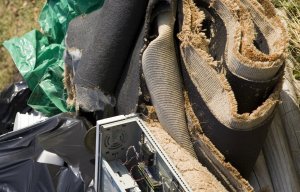
New CRUK resource for carpet recycling
Birla Cellulose to provide expertise in developing and preparing new materials for wider adoption in the fashion supply chain.

22nd February 2022
Innovation in Textiles
|
Amsterdam
Fashion for Good’s new Untapped Agricultural Waste Project is aiming to validate and scale technologies that can successfully lead to sustainable textile fibres.
With catalytic funding provided by Laudes Foundation and partners adidas, Bestseller, Birla Cellulose and Vivobarefoot, the project will assess the technical feasibility of natural fibres created by six selected innovators – AltMat, Bananatex, Chlorohemp, Agraloop by Circular Systems, HempTex India and 9Fiber – using agricultural waste such as rice husks, hemp, wheat straw, banana and pineapple.
Up to 92 million tons of agricultural waste is burned annually in India alone
“This ambitious project explores a new source of feedstocks for the fashion industry that, if scaled, will help drive both the agriculture and textile industry towards net-zero,” said Katrin Ley, Fashion for Good managing director. “We see great potential for these various agriculture waste streams that would otherwise have few secondary uses. By applying innovative technologies to develop natural fibres, we can diminish the pressure on existing natural fibres and shift away from unsustainable materials and sources.”
Agricultural waste poses significant challenges for farmers in South and Southeast Asia and in many cases the waste is not repurposed and is often burned. Up to 92 million tons of agricultural waste is burned annually in India alone, which in 2017 resulted in approximately 149 million tons of CO2. At the same time, the extraction and processing of virgin, conventional fibres such as cotton and polyester accounts for up to 39% of greenhouse gas emissions in the textile supply chain, as highlighted in Fashion for Good’s recent report Unlocking the Trillion-Dollar Fashion Decarbonisation Opportunity. The report charts a funding and solution-driven trajectory for the industry to meet its net-zero ambition. Raw Material innovation is essential to reducing these emissions, and the next generation of materials are key if the industry is to decarbonise its supply chain.
The project will specifically focus on repurposing agricultural waste into viable new natural fibre blends. Birla Cellulose will work closely with the innovators providing expertise to develop and prepare their new materials for wider adoption in the fashion supply chain, with the participating project brand partners supporting the testing and eventual scaling of these fibres.
This first phase of the project concludes in December 2022. To further drive supply chain adoption and move beyond lab scale, the next phase will pilot the agri-waste fibres from selected innovators in collaboration with partner brands and supply chain players in commercial facilities to produce larger quantities. The ultimate aim is to enable brand offtake agreements and financing for scaling.

Business intelligence for the fibre, textiles and apparel industries: technologies, innovations, markets, investments, trade policy, sourcing, strategy...
Find out more